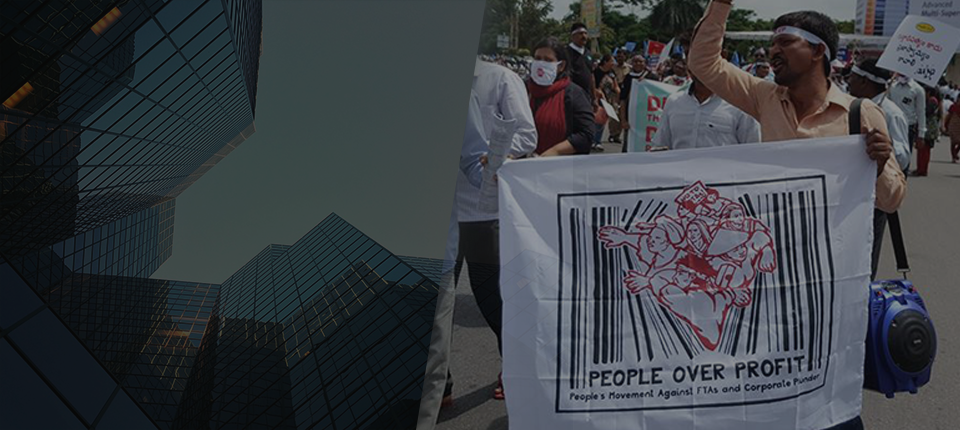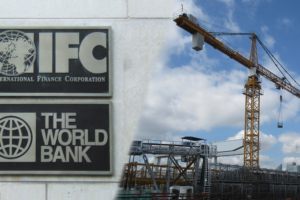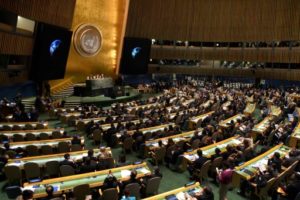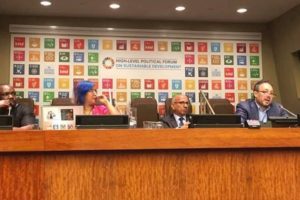[[{“type”:”media”,”view_mode”:”media_original”,”fid”:”2065″,”attributes”:{“alt”:””,”class”:”media-image”,”height”:”430″,”style”:”width: 600px; height: 269px;”,”typeof”:”foaf:Image”,”width”:”960″}}]]
Since 2014, a UN process has been underway towards establishing a treaty that aims to regulate transnational corporations’ (TNCs) activities and hold them accountable for rights violations under international human rights law. This moved in steady increments, from a UN Human Rights Council resolution to create a working group among governments (“open-ended intergovernmental working group” or OEIGWG). After two sessions, in 2015 and 2016, and consultations in between, the third OEIGWG session in October 2017 discussed the elements of the draft legally binding treaty. Informal consultations are ongoing, towards a fourth session in October 2018.
As per the September 2017 version of the binding treaty draft, states would be obligated to ensure “civil, administrative, and criminal liability” especially of TNCs and addressing possible violations of human rights. This could be through national legislation, such as strengthening or creating penalties for corporations in violation.
The third session – the EU, US and Australia bare the interests they serve
The third session in 2017 revealed the unwillingness of big industrialised countries to the idea of a legally binding treaty – a huge indication of their fear to compromise the interests of their TNCs in general. The European Union (EU) representative failed to derail the process during the third working group session, despite their objection to a fourth session.[i]
The United States and Australia, meanwhile, boycotted the process in which around 100 state representatives participated– but also attempted to slow it down on pretexts of procedural matters.[ii] 134 corporations in the 2016 Fortune Global 500 ranking of the biggest transnationals are based in the US, while 124 are based in the EU.[iii]
Attempts against the process did not end there. In mid-December 2017, Treaty Alliance, an international group of over 700 civil society organisations for a binding treaty, warned that the EU had attempted to defund the process for the UN treaty. This resolution was eventually withdrawn.
Towards the fourth session in October
With the fourth session approaching, which aims to present a draft of the treaty, civil society especially in the global South will have to be more watchful than ever. Big industrialised countries and TNCs will likely continue to block or water down the treaty, or look for ways to derail the process.
The conclusions of the third session mandated the Chief-Rapporteur of the OEIGWG to “undertake informal consultations with States” and other stakeholders, as well as to “present a draft legally binding instrument…on the basis of the[se] contributions.”
This should be presented “at least four months before the fourth session (in October 2018),” therefore by June. With this timeframe and how the process could be blocked without active state participation, the broad Treaty Alliance released a statement calling on UN member states to provide “substantive comments” to the informal consultations and “substantive proposals on the draft treaty.” Given how “procedural issues” have been the excuse of industrialised powers to stop the process, states are now being encouraged to provide clear proposals on how the fourth session should be “organised to achieve the mandate in the shortest time possible.”
Legal instruments that could check on corporate power are welcome. But challenges at negotiation-level are only the beginning. Should the treaty successfully enter into force, the means to implement it and the means to monitor state practice against their commitments – these would be open questions. How much policy space states are willing to allow for regulation is also an important question, especially since this would mean shifting their economic policy. For decades, the trend has been towards opening up to corporations or “the private sector.”
Upholding peoples’ sovereignty
With some exceptions, governments and economic development planners in the global North and alarmingly so in the South have had decades of following the neoliberal policy track – liberalising the economy to “foreign investment,” privatising sectors such as social services, and loosening regulation of corporate activities. Corporate impunity in the global South, as we know it, has become a norm through governments that favour – or are captured by – foreign and domestic elite interests.
Peoples and their organisations should keep in mind that grassroots and collective assertions remain essential not just to address TNC rights violations, but to hold elite-led states accountable as well – whatever outcome may result in the current negotiations for a binding treaty.
Addressing the long-time complicity of states and TNCs
To government-licensed mining plunder of TNCs, indigenous peoples have had and should continue to assert their right to self-determination and ancestral domains. In the face of corporations’ tax holidays and low wages in special economic zones, workers assert their right to just wages, employment and their unions. With governments signing “free trade” agreements that favour big agricultural and chemical corporations, farmers assert rights to their land.
Peoples will have to assert their rights and sovereignty, towards pushing their states to review and reject policies that entrench foreign and domestic elites, and assert their voices in development planning processes. With continuing conversations today not just on corporate impunity but also on inequality, rising corporate power, free trade agreements, the Agenda 2030, and the slow rejection of neo-liberalism, these are ever more important towards any people-centred development agenda. ###
[i]https://www.euractiv.com/section/economy-jobs/opinion/un-treaty-negotiations-a-chance-for-the-eu-to-champion-human-rights/
[ii]http://ridh.org/news/respect-for-human-rights-by-transnational-corporations-is-not-a-game/
[iii] Quintos, Paul. 2017. “Notes on Monopoly Capital in the 21st Century.” In Lenin’s ‘Imperialism’ in the 21st Century. Manila: Institute of Political Economy. https://iboninternational.org/IPE/Lenin%27s-Imperialism-21st-Century



